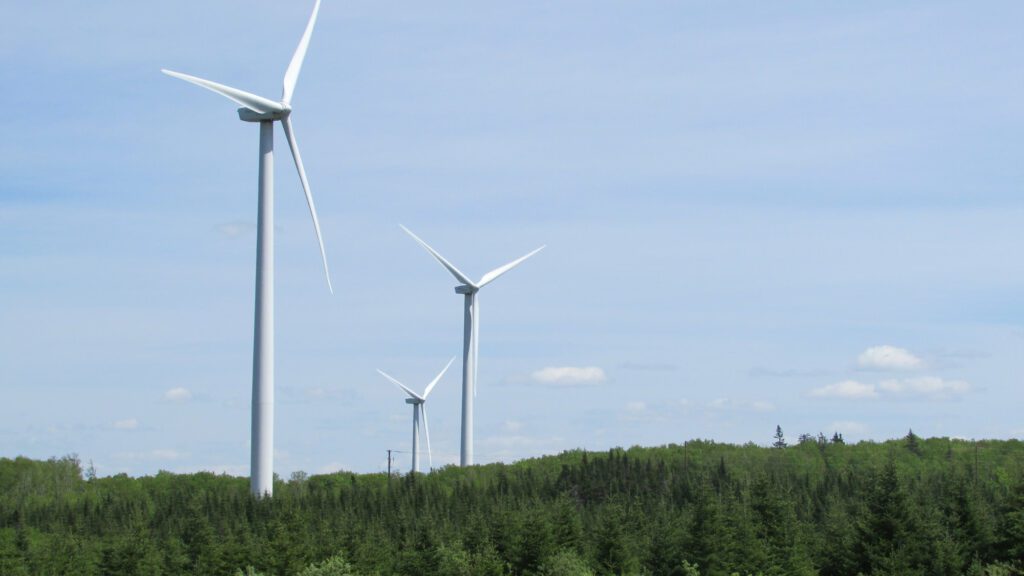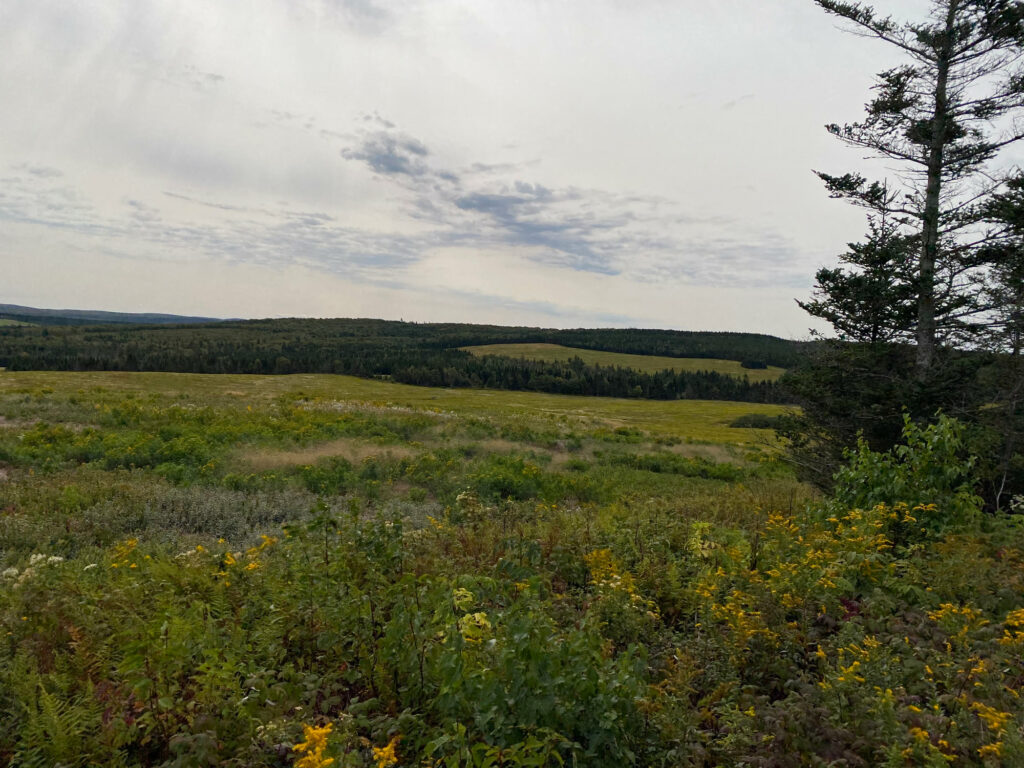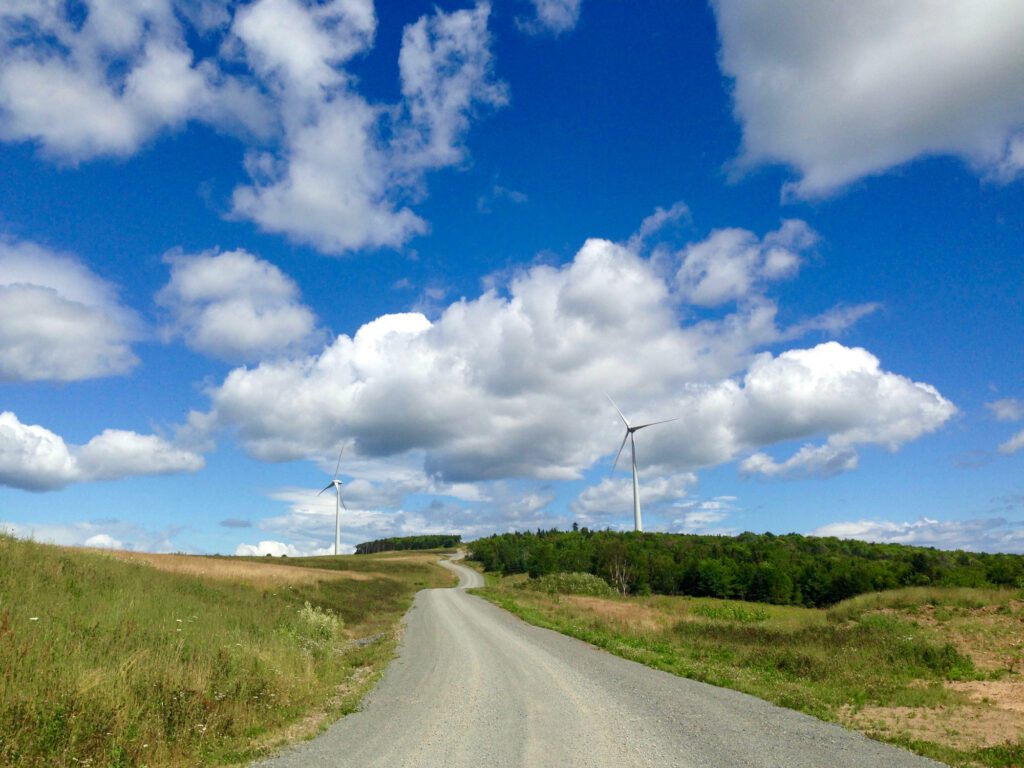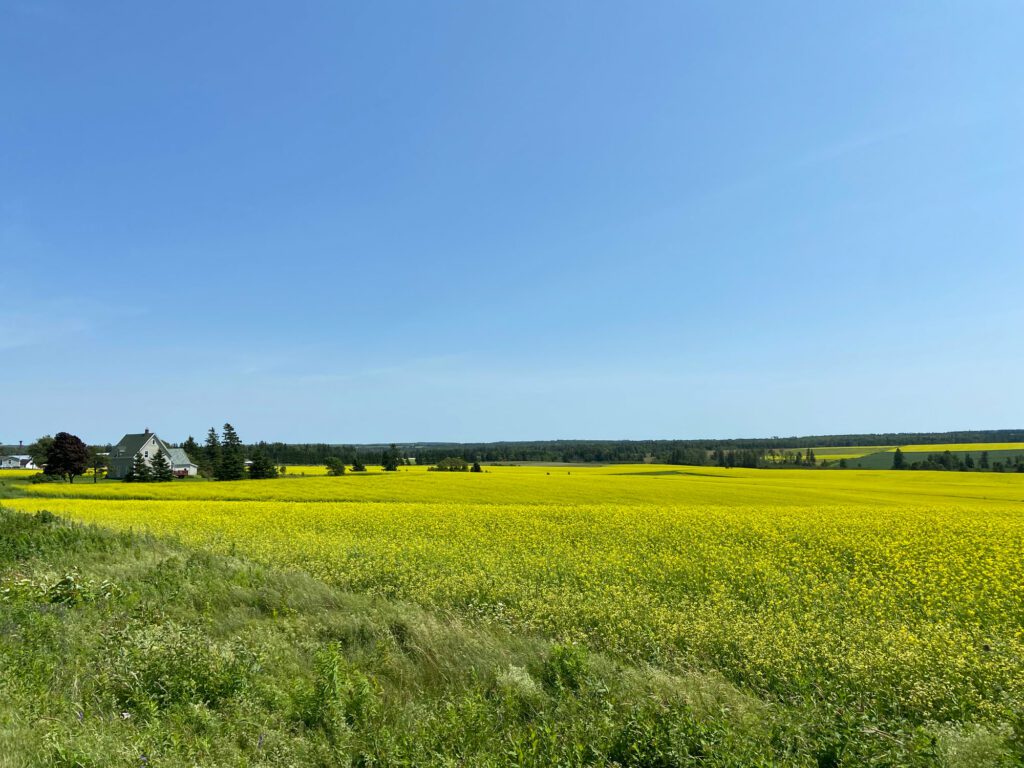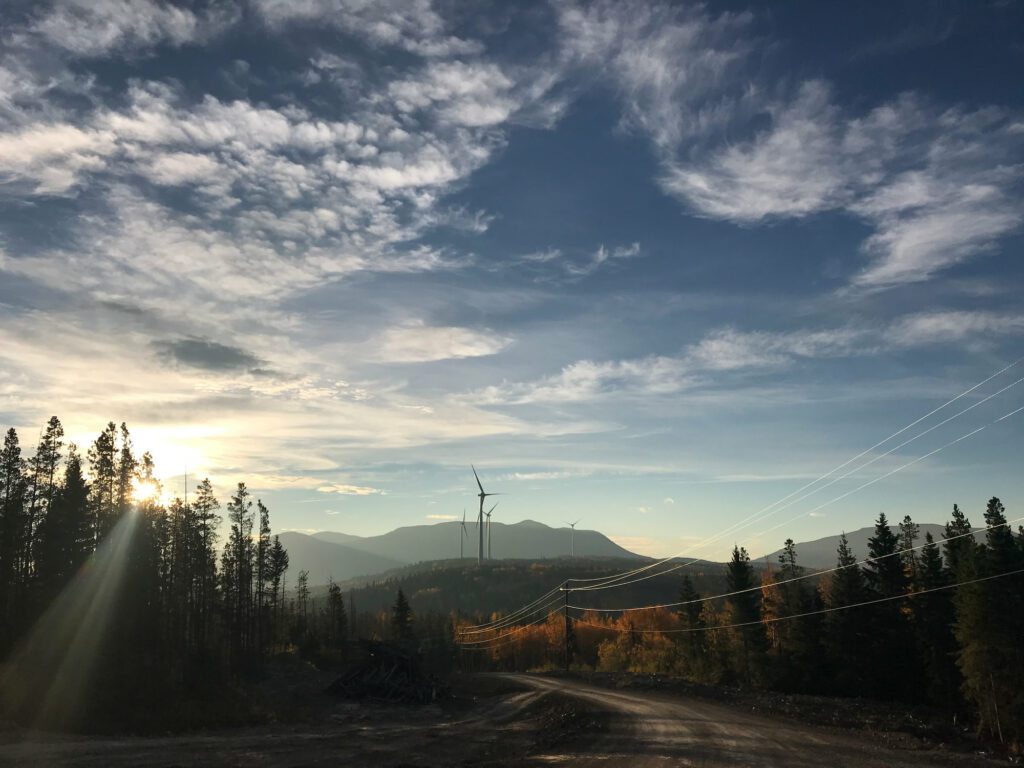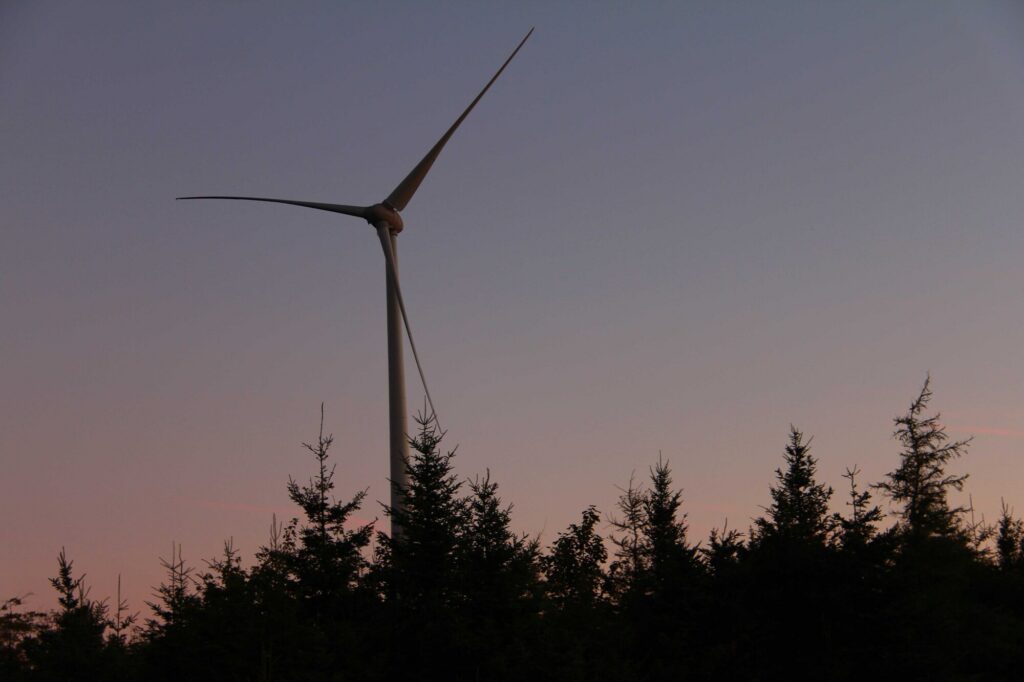Community Liaison Committee
A Community Liaison Committee (CLC) facilitates communication between project proponents, local community members, and special interest groups throughout the lifetime of a project. The project partners are seeking interest in the formation of a CLC for the Clydesdale Ridge Wind Project to discuss project information and any local ideas and concerns. If you are interested in joining a CLC for the Project in a voluntary capacity, please reach out to us at the contact information below.
NOVEMBER 2, 2023 UPDATE:
Natural Forces and RMS Energy intend to bid the proposed Clydesdale Ridge Wind Project into the provincial Green Choice Program Request for Proposals. Updates will be posted here on the project website and will be sent to our mailing list, which you can join below. The following notice was sent to members of the surrounding community:
November 2023 Green Choice Program Notice
MAILING LIST
To join the mailing list for the Clydesdale Ridge Wind Project, please click on the link below and fill out your contact information.
About The Project
This project is located in Mi’kmaki, the ancestral territory of the Mi’kmaq. Natural Forces acknowledges that working on these lands is a privilege that comes with a great deal of responsibility. We believe that private companies have an important role to play in the decolonization of the energy sector and, ultimately, the path towards reconciliation through partnerships and meaningful engagement. To honour and achieve this, we must look forward for generations and integrate the practices and knowledge of the original land stewards, the Mi’kmaq, into project planning.
The proposed Clydesdale Ridge Wind Project is being developed by a partnership formed between Natural Forces and RMS Energy who will together develop, construct, operate, and own the project.
The initial plans are for the proposed project to consist of up to an estimated 18 wind turbines. Depending on which wind turbine generators are deemed most appropriate for the project, these 18 turbines could have a total installed capacity up to approximately 70 MW. The project is located on the border between Colchester County and Pictou County in the Berichan area, approximately 7 km northwest of the operational Dalhousie Mountain Wind Farm.
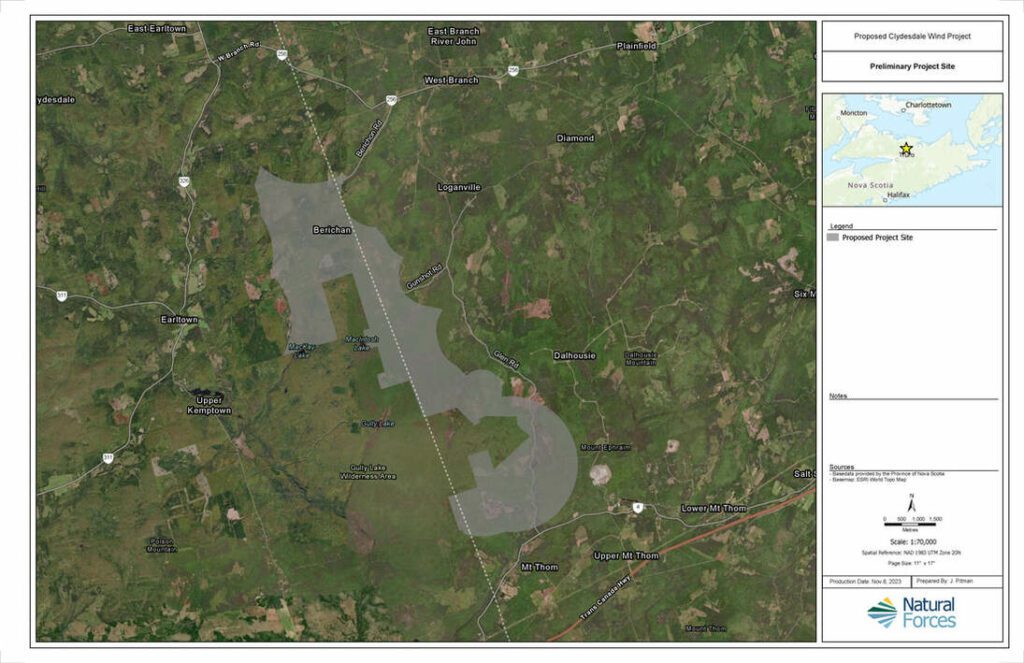

Project Milestone Timeline
- December 2021 – January 2022 – three open houses were hosted at the Kemptown Community Hall, two open houses were hosted at the Dalhousie Mt Snowmobile Clubhouse, and one open house was hosted at the West River Fire Hall
- April 2022 – New environmental studies began on site
- May 2022 – Project was bid into the Nova Scotia Rate Base Procurement Program
- February 2023 – The new Colchester County Wind Turbine Development Bylaw came into effect. Information can be found here.
- September 2023 – Two meteorological towers were installed on site to collect wind resource data
- November 2023 – Notice sent to community members of the intention to bid the project into the Green Choice Program
- March 2023 – Public information session held at the Kemptown Community Centre (59 Loop Old Hwy 4, Kemptown, NS B6L 2M4), 4-7 pm.
Who is proposing this project?
RMS Energy is a full service wind turbine maintenance company based in Nova Scotia. RMS Energy oversees several different aspects of wind energy: development; construction; management; and operations including maintenance of large scale and community-based projects.
Alongside involvement in other wind projects in Nova Scotia, RMS Energy maintains and operates the Dalhousie Mountain Wind Farm near Mount Thom, Nova Scotia.
To learn more about RMS Energy, please visit their website here.

Natural Forces
Natural Forces is an independent power producer that develops, owns, and operates renewable energy projects. Natural Forces was established in 2001 and has its head office in Halifax, NS, as well as regional offices in Chetwynd, British Columbia; Quispamsis, New Brunswick; and Dublin, Ireland. Collectively, Natural Forces has close to 300 MW of renewable energy projects in operation across Canada, with several ongoing projects at various stages of completion in Nova Scotia, New Brunswick, Prince Edward Island, Labrador, Saskatchewan, British Columbia, and Ireland.
The senior management team at Natural Forces has over 70 years of combined renewable energy experience encompassing all project life cycle activities in a range of international locations including Canada, Ireland, Poland, the UK, and Australia. Natural Forces is an integrated developer and operator of renewable energy assets. The in-house team undertakes all activities from initial site selection, development, financing, construction, operations, and asset management. Our vision is to develop, construct, operate, and own clean renewable energy projects across Canada in partnership with local and Indigenous communities.
Why here?
When developing a wind project, it is crucial to find the most suitable location and community to host it. To do so, there are four main factors to consider during the site-finding phase of development:
- Wind resource
- Distance to existing electrical and civil infrastructure
- Environmental sensitivity
- Socio-economic concerns
Nova Scotia has excellent wind resources, so generating electricity is feasible in many locations around the province. Factors other than the strength and consistency of the wind must be taken into account when considering a site, such as proximity to the electricity grid, road access, ecology, archaeology, and cultural significance, proximity to residential dwellings, and health concerns.
The location of the proposed Clydesdale Ridge Wind Project was selected after a thorough review of all of these factors.
Public & Stakeholder Engagement
The development of wind energy in Nova Scotia provides a clean and stable source of energy and positively impacts local communities in a variety of ways. These include economic spinoff through the increase in demand of local goods and services and job creation, most notably during the construction phase. Natural Forces is committed to engaging with all stakeholders and stakeholder groups throughout the lifetime of the project, as we value community input greatly. Below are details on the newsletters that have been sent to our stakeholders, as well as summaries of the information that has been shared at our open houses.
Newsletters
The project partners have engaged with, and continues to engage with, stakeholders through a number of avenues, including newsletters. Each of the newsletters will be linked below:
Open Houses
The project partners have held open houses to provide an opportunity for the community to engage with project staff. All of the information that will be presented at these open houses will be uploaded here.
The project partners will continue to host open houses throughout all phases of the project.
What is the process?
1
Development
(Current Stage)
- Assess the wind resource
- Survey for environmentally sensitive features
- Optimize turbine location to capture the wind efficiently and minimize impact on sensitive features
- Begin consultation with regulators and the public
- Conduct and present the Environmental Impact Assessment for environmental approval
- Apply for road, work and construction permits
2
Construction
- Clear trees for roads and turbine pads
- Build access roads and pad areas
- Pour the turbine foundation
- Assemble the wind turbine
- Connect to NS Power’s electrical grid
3
Operation
- Commission the wind turbines to start producing power
- Conduct post-construction wildlife monitoring
- Monitor remotely for real time alerts when additional maintenance is needed
- Operate for 30 years
4
Decommission or Retrofit
- Assess wind turbines after 30 years
- Decommission wind turbines in 3-6 months
- Reclaim the site to its former state OR
- Receive approvals and permits to retrofit the turbine to continue harnessing energy
Environmental Assessment
In Nova Scotia, any wind projects that exceed 2 MW in size are required to complete a provincial environmental impact assessment (EIA). During this process, an entire committee made of provincial and federal agencies evaluate the location and overall impact of the project on the surrounding environment and the public. As the Clydesdale Ridge Wind Project will produce up to approximately 70 MW of electricity, it is subject to an EIA.
To fully assess the potential environmental impacts of the project, the following comprehensive studies are being conducted:
- Wetlands and Watercourses Surveys
- Bird and Bat Surveys
- Mainland Moose Surveys
- Vegetation and Habitat Surveys
- Noise and Visual Assessments
- Radiocommunication Impact Assessments
- Archaeological Assessments
While the project did gain EIA approval from the Nova Scotia Minister of Environment and Climate Change in August 2012, due to the time that has passed, the project partners are working to complete a new EIA. As such, experts, including biologists, botanists, and birders, were hired in 2022 to begin environmental studies on the project site and have continued their work through 2023. The final studies will be carried out in 2024. The results from these studies will be compiled in the EIA document that will be registered with the province. When complete, the full EIA document and the associated studies will be available for download below.
More information on the EIA process can be found on the provincial EIA website.
Frequently Asked Questions
The project partners have and continue to undertakes rigorous environmental impact assessments to determine existing environmental sensitivities and potential impacts on the project to the environment. This information will be reviewed by provincial government officials and will be open for public comment prior to any construction activities.
Change answer to: The proposed turbine locations will be setback at least 1 km from all residences, unless express permission is granted by the homeowner.
For this project, the project partners have worked closely with the private landowners to build trusted relationships and to secure contracts to lease the lands for the project. The project partners are also working with the province to secure agreements to use provincial Crown land for the project infrastructure.
Leading up to and during construction, the project partners will make every attempt to hire local contractors, using our in-house construction management company, Natural Forces Construction, to ensure smaller contractors are able to participate.
Wind turbines have moving parts and therefore some sound can be expected. However, well-designed wind turbines are generally quiet in operation, and compared to the noise of road traffic, trains, aircraft, and construction activities, the sound from wind turbines is very low. As wind turbine technology has evolved, the sounds emitted have decreased. The further away you are from a project, the less sound it will make. This site has trees and other barriers that would break a lot of the sound before it reaches homes. A typical wind project would have a noise level of between 35-45 decibels. For reference, the compressor of a refrigerator produces 40-45 decibels. (Check out the Energy Nova Scotia Wind Page for more information). Stories of excessive noise often come from areas where the turbines are very close to homes. The project partners will follow the minimum standards for distance from residences laid out by local regulations, or a typical minimum of 1 km.
For more information contact:
Meg Morris, Project Manager
902-483-9592
community@naturalforces.ca

